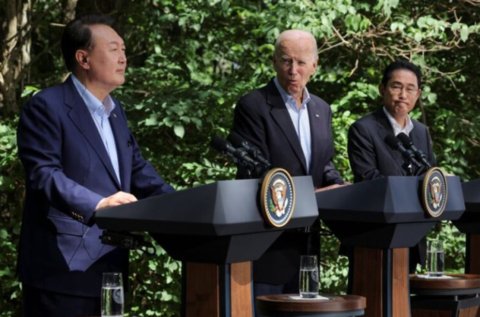By Yun Ge and Dian Cang

ROK President Yoon Suk-yeol, US President Joe Biden, and Japanese Prime Minister Fumio Kishida at Camp David (Source: Beijing Daily)
The leaders of Japan, the ROK, and the United States met at Camp David, Maryland recently. Camp David, where Roosevelt met with Churchill during WWII and where Egypt and Israel reached a settlement agreement in 1978, is known for hosting "significant" diplomatic events.
No sooner did the Camp David meeting wrap up than the three governments announced the "rich outcomes" of the meeting that would allegedly set the tone for the century.
The trilateral summit lasted three hours and adopted several documents, including:
First, the three countries agree to have at least one leaders' summit every year, in addition to meetings of foreign ministers, defense ministers, finance ministers, and national security advisors.
Second, they plan to hold annual, multi-domain military exercises and realize real-time sharing of missile early warning data by the end of 2023.
Third, they agree to expand cooperation, particularly in economic and technological sectors. A supply chain early warning system will be tried out in such areas as semiconductors, new energy battery, key minerals, and AI.
According to some foreign media outlets, the Camp David summit indicated the US, Japan and ROK's intention for closer cooperation in a wider scope and at a greater depth in addition to the current focus on defense collaboration. Although the US side deliberately emphasized that the collaboration is not aimed against China, the documents adopted at the summit highlighted fallacies about the "Taiwan Strait" and the so-called "dangerous and aggressive behavior supporting unlawful maritime claims…by the PRC".
Sun Chenghao, an assistant researcher at the Center for International Security and Strategy, Tsinghua University, said the US, by forming a clique in the Asia Pacific, intends to focus its energy on mobilizing the strengths of its allies and partners in the competition against China. At Camp David, Washington expressed its commitment to strengthening the alliance with Japan and ROK – its consistent allies – through the linkage of interests. At the same time, it takes steps to bring India, Australia and New Zealand to its side in an attempt to introduce NATO and other extraterritorial forces to the Asian Pacific region.
According to Li Jiacheng, associate professor at the School of International Economics and International Relations, Liaoning University, the three countries' vow to realize real-time sharing of missile early warning data by the end of this year is a prelude to trilateral intelligence collaboration – the "Three Eyes". ROK and Japan's closer military affiliation with the US will bring new threats to the Korean Peninsula.
Despite the summit's high profile, each of the three countries has its own ax to grind behind the seeming cohesion due to their varied core interests in the Asia Pacific. ROK is concerned about issues on the Korean Peninsula, Japan about the Diaoyu Islands and the East China Sea, and America the strategic competition with China. Tokyo and Seoul may follow Washington's lead in certain areas of the supply chain and semiconductor policy, but they are unwilling to sever their economic ties with China. The different demands and pursuits make the trilateral cooperation less iron-clad than it appears.
While the Yoon Suk-yeol administration has been working hard for reconciliation with Japan, the historical problems between the two countries, such as the comfort women issue and forced labor in WWII, as well as modern disputes like over the Liancourt Islands are time bombs hanging over bilateral relations. Li Jiacheng held that an Asian-Pacific version of NATO won't take form any time soon because the ROK people won't accept Japanese troops setting foot on the Korean Peninsula. Having ROK help defend Japan when the latter is under foreign attack is even more unimaginable.
Observers in Japan commented that while the Kishida administration has taken an upper hand because of Seoul's "humiliating diplomacy", a real reconciliation between the Japanese and ROK people is not anywhere in sight. The three leaders all vow to institutionalize their cooperation, but next year will see America's presidential election and the election of ROK's National Assembly. A change on top of any side will mean a possible change of policy, and whether the "outcomes" of the Camp David summit will endure is really hard to say.
Editor's note: Originally published on haiwainet.cn, this article is translated from Chinese into English and edited by the China Military Online. The information and opinions in this article do not necessarily reflect the views of eng.chinamil.com.cn.













